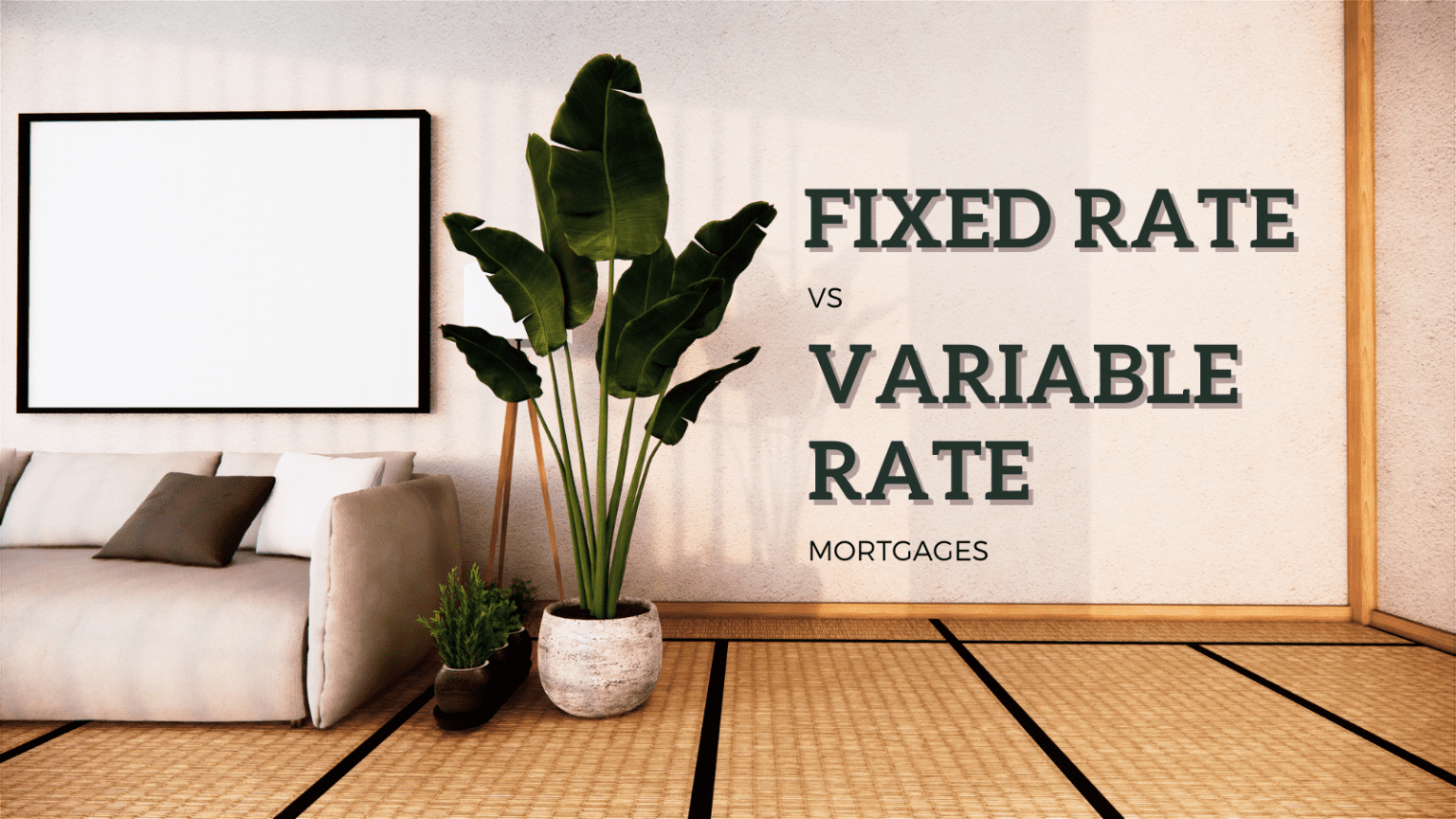When diving into the Toronto real estate market, one of the most crucial decisions you’ll face as a homebuyer is choosing between a fixed rate and a variable rate mortgage. Each option has its unique benefits and drawbacks, and the right choice depends on your financial situation, risk tolerance, and market conditions. In this post, we’ll explore both options to help you make an informed decision.
Table of Contents
Fixed Rate Mortgages: Stability and Predictability
A fixed-rate mortgage in Toronto, as in other parts of Canada, is a loan where the interest rate remains constant throughout the term. These terms can vary, typically ranging from 1 to 5 years, but some lenders offer terms extending up to 10 years or even longer. This type of mortgage is particularly popular among buyers who value consistency and predictability in their financial planning.
Pros of Fixed Rate Mortgages
Predictability and Ease of Budgeting: The most significant advantage of a fixed-rate mortgage is the predictability of your mortgage payments. Regardless of market fluctuations or economic changes, your payment remains the same throughout the term. This stability is exceptionally beneficial for homeowners who prefer to have a consistent budget, allowing for easier long-term financial planning.
Protection Against Rate Increases: In an environment where interest rates are rising or predicted to rise, a fixed-rate mortgage shields you from these increases. Your rate won’t change, which can lead to significant savings over time compared to a variable-rate mortgage if rates go up.
Simplicity and Ease of Understanding: Fixed-rate mortgages are straightforward to understand, making them a good choice for first-time homebuyers or those who prefer not to actively monitor interest rate trends.
Cons of Fixed Rate Mortgages
Higher Initial Rates: Generally, fixed rates are higher than the initial rate of a variable mortgage. This means you might pay more for the stability and predictability that a fixed rate offers, especially if the Bank of Canada’s rate, which influences variable rates, remains low.
Penalties for Early Termination: One of the most significant downsides of a fixed-rate mortgage is the potential penalty if you decide to break your mortgage term early. These penalties can be substantial, often calculated as the greater of three months’ interest or an interest rate differential (IRD). The IRD can be particularly high if interest rates have fallen since you locked in your rate, making it costly to refinance or sell your property before the term is up.
Less Flexibility: Fixed-rate mortgages typically offer less flexibility than their variable-rate counterparts. For instance, you may have limited options for additional lump-sum payments, or there may be restrictions on transferring your mortgage to another property.
Is a Fixed Rate Mortgage Right for You?
When considering a fixed-rate mortgage in Toronto, it’s essential to assess not only the current interest rates but also your financial situation, your risk tolerance, and your long-term housing plans. Fixed-rate mortgages are often best suited for:
- Homebuyers who prioritize budget stability over potential interest rate savings.
- Those who are risk-averse and prefer not to worry about fluctuating interest rates.
- Buyers who plan to stay in their home for the entire term of the mortgage.
In summary, fixed-rate mortgages in Toronto offer stability and predictability but come at the cost of potentially higher rates and less flexibility.
Variable Rate Mortgages: Flexibility and Potential Savings
In Toronto’s ever-changing real estate market, a variable-rate mortgage offers a dynamic option for homebuyers. This type of mortgage is directly tied to the lender’s prime rate, which fluctuates in response to economic factors and decisions made by the Bank of Canada. Your interest rate will be the lender’s prime rate plus or minus a specified percentage, which means it can change over the term of your mortgage.
Pros of Variable Rate Mortgages
Lower Initial Rates: Typically, the initial interest rates for variable mortgages are lower than those for fixed-rate mortgages. This can result in significant savings, especially in the early years of the mortgage when a larger portion of your payment goes towards paying interest rather than the principal.
Flexibility and Lower Penalties: Variable-rate mortgages usually offer greater flexibility. This includes options such as the ability to convert to a fixed rate at any time and typically lower penalties for breaking the mortgage term early. This can be a significant advantage if you plan to sell your property or refinance before the end of your term.
Potential Long-Term Savings: If interest rates decrease, you’ll benefit from lower payments. Over time, this could lead to substantial savings compared to a fixed-rate mortgage.
Cons of Variable Rate Mortgages
Payment Uncertainty: The most notable drawback of a variable rate mortgage is the uncertainty. Your payments can fluctuate as the prime rate changes, making it more challenging to budget and plan financially, especially if you are on a tight budget.
Interest Rate Risk: While you can benefit from decreasing rates, the opposite is also true. If interest rates rise, so will your mortgage payments. This can lead to higher costs over the term of your mortgage and potential financial strain if the increases are significant and prolonged.
Complexity and the Need for Active Management: Understanding and managing a variable-rate mortgage requires a certain level of financial literacy and comfort with market fluctuations. You’ll need to keep an eye on economic trends and be prepared to make decisions about converting to a fixed rate or adjusting your budget as rates change.
Is a Variable Rate Mortgage Right for You?
Opting for a variable rate mortgage in Toronto depends on several factors:
- Risk Tolerance: If you are comfortable with some level of risk and have the financial flexibility to handle potential increases in payments, a variable-rate mortgage could be a good fit.
- Market Analysis: Staying informed about market trends and economic forecasts can help you anticipate changes in interest rates.
- Financial Cushion: Having a financial cushion to accommodate potential increases in payments can make a variable-rate mortgage more appealing.
They are ideal for those who are financially secure, comfortable with a degree of uncertainty, and willing to actively manage their mortgage in response to market changes.
Choosing the Right Option for You in Toronto
Consider Your Risk Tolerance:
- If you prefer stability and fixed monthly payments, a fixed rate might be more suitable.
- If you can handle potential fluctuations in your monthly payments, a variable rate might offer more savings.
Analyze the Market:
- Research the current state of the Toronto real estate market and predictions for interest rates.
- Speak to a financial advisor or mortgage broker who can provide insights specific to your situation.
Long-Term Plans:
- Consider your long-term financial goals and how your mortgage choice aligns with these plans.
- Fixed rates might be more appealing if you plan to stay in your home for the entire term of the mortgage.
The Bottom Line:
Choosing between a fixed and variable rate mortgage in Toronto is a significant decision. It’s essential to consider your financial stability, risk tolerance, and long-term plans. Keep in mind that mortgage rates can be negotiated. Don’t hesitate to shop around and negotiate with lenders to find the best rate possible for your situation.


Pierre Carapetian
Pierre Carapetian is the Broker Of Record for Pierre Carapetian Group Realty with over 12 years of experience in the real estate market. As a proud Torontonian and real estate broker, he prides himself on knowing this city inside out. He started investing at the age of 18 and has facilitated over half a billion dollars in real estate transactions.


